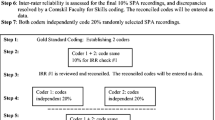Abstract
We describe a half-day workshop to teach third-year medical students three focused end-of-life care skills: breaking bad news, discussing advance directives, and assessing and managing pain. Our workshop included a readers’ theater exercise and three role-play exercises. In two of the workshops, faculty members played the role of patients. We used readers’ theater to engage the students on an emotional level and set a reflective tone for the workshop. Evaluations reflected that most respondents felt that the workshop enhanced their understanding and ability to address these skills with patients. By 6 months, many students reported applying these skills to patient care in a way they thought was effective.
Similar content being viewed by others
References
Billings JA, Block S. Palliative care in undergraduate medical education: status report and future directions. JAMA. 1997;278:733–8.
Field MJ, Cassel CK. Approaching Death: Improving Care at the End of Life. Institute of Medicine Report. Washington, DC: National Academy Press; 1997.
Sullivan AM, Lakoma MD, Block SD. The status of medical education in end-of-life care: a national report. J Gen Intern Med. 2003;18:685–95.
Butow PN, Kazemi JN, Beney LJ, Griffin LJ, Dunn SM, Tattersall MH. When the diagnosis is cancer: patient communication experiences and preferences. Cancer. 1996;77:2630–7.
Ramirez AJ, Graham J, Richared MA, et al. Burnout and psychiatric disorder among cancer clinicians. Br J Cancer. 1995;71:1263–9.
Foley KM. Competent care for the dying instead of physician assisted suicide. N Engl J Med. 1997;336:54–8.
Novack CH, Volk G, Drossman DA, Lipkin M. Medical interviewing and interpersonal skills teaching in US medical schools. Progress, problems and promise. JAMA. 1993;269:2101–5.
Charlton R, Ford E. Education need is in palliative care. Fam Pract. 1995;12:70–4.
Fallowfield L. Giving sad and bad news. Lancet. 1993;341:476–8.
Frankel RM, Speice J, Branca L, et al. Oncology providers’ and patients’ experience with communication problems. Proc Am Soc Clin Oncol. 1997;16:45a.
Rappaport W, Witzke D. Education about death and dying during the clinical years of medical school. Surgery. 1993;113:163–5.
Pan CX, Soriano RP, Fischberg DJ. Palliative care module within a required geriatrics clerkship: taking advantage of existing partnerships. Acad Med. 2002;77:936–7.
Savitt Todd L. Medical Readers’ Theater: A Guide and Scripts. Iowa City: University of Iowa Press; 2002.
Moore L. People like that are the only people here: canonical babbling in peed onk. In Birds of America. Knopf; 1998.
Buckman R. How to Break Bad News: A Guide for Health Care Professionals. Baltimore: Johns Hopkins University Press; 1992.
Ptacek JT, Eberhardt TL. Breaking bad news: a review of the literature. JAMA. 1996;276:496–502.
Cole SA, Bird J. Medical Interviewing: The Three-Function Approach. St. Louis: Mosby; 2000;1991.
Baile WF, Kudelka AP, Beale EA, et al. Communication skills training in oncology: description and preliminary outcomes of workshops on breaking bad news and managing patient reactions to illness. Cancer. 1999;86:887–97.
Serwint JR. The use of standardized patient in pediatric residency training: anatomy of a standardized patient case scenario. J Palliat Med. 2002;5:146–53.
Benbassat J, Baumal R. A step-wise role playing approach for teaching patient counseling skills to medical students. Patient Educ Couns. 2002;46:147–52.
Littlefield JH, Hahn HB, Meyer AS. Evaluation of a role-play learning exercise in an ambulatory clinic setting. Adv Health Sci Educ. 1999;4:167–73.
Charon R. The patient-physician relationship. Narrative medicine: a model for empathy, reflection, profession, and trust. JAMA. 2001;286:1897–902.
Mann BD, Sachdeva AK, Nieman LZ, Nielan BA, Rovito MA, Damsker JI. Teaching medical students by role playing: a model for integrating psychosocial issues with disease management. J Cancer Educ. 1996;11:65–72.
Knowles C, Kinchington F, Erwin J, Peters B. A randomized controlled trial of the effectiveness of combining video role play with traditional methods of delivering undergraduate medical education. Sex Transm Infect. 2001;77:376–80.
Schmidt TA, Norton RL, Tolle SW. Sudden death in the ED: educating residents to compassionately inform families. J Emerg Med. 1992;10:643–7.
Author information
Authors and Affiliations
Corresponding author
Additional information
This project was supported by a grant from the Courts Foundation, Atlanta, Ga. We wish to thank Tanisha J. Sullivan, BA for coordinating the workshop.
Rights and permissions
About this article
Cite this article
Torke, A.M., Quest, T.E., Kinlaw, K. et al. A workshop to teach medical students communication skills and clinical knowledge about end-of-life care. J GEN INTERN MED 19, 540–544 (2004). https://doi.org/10.1111/j.1525-1497.2004.30115.x
Issue Date:
DOI: https://doi.org/10.1111/j.1525-1497.2004.30115.x




